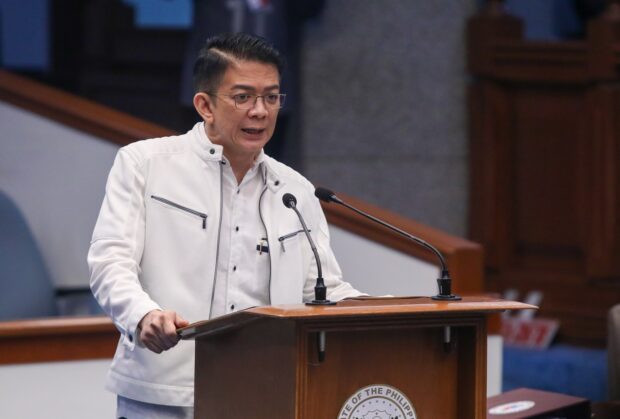
Sen. Francis “Chiz” G. Escudero (Photo from the Senate Public Relations and Information Bureau)
MANILA, Philippines — In its rush to pass legislation for the Maharlika Investment Fund (MIF), both houses of Congress committed serious procedural and substantial legal errors that may nullify the law from the start, Sen. Francis Escudero said on Saturday.
The errors, as shown in the enrolled bill, are remediable, Escudero said, but fixing them will require that the Senate and House of Representatives admit to making a congressional boo-boo yet again.
“I believe that the errors cited are not matters of style and correcting them cannot just be a ‘perfecting amendment,’” Escudero said, pointing to the law’s approval, which did not comply with constitutional requirements.
Escudero made the statement two days after the Senate and the House of Representatives convened for what was described by Congress leaders as a “pre-bicameral conference committee” meeting.
Conflicting provisions
But no bicameral conference committee report came out of that meeting because Senate President Juan Miguel Zubiri said there was no need.
There were also conflicting provisions on the prescriptive period of crimes punishable under the Maharlika law, as exposed by Senate Minority Leader Aquilino Pimentel III.
But Escudero still urged the public to give congressional leaders a chance to correct the mistakes in an appropriate manner.
“Let us give them a chance to look at themselves in the mirror, see for themselves if there is anything that needs correcting. It will be more painful if someone points out your mistakes, so we’ll let them admit to their mistakes,” he said.
The senator declined to speculate on the rush to approve the MIF bill although it was not among the priorities that President Ferdinand Marcos Jr. announced in his first State of the Nation Address.
Poorly crafted
Escudero also wondered whether Marcos was misinformed after making pronouncements that the prohibition against the investment of pension and social welfare funds was only applicable in the initial stages of the implementation of the Maharlika law.
The senator said he would have voted against the MIF after proponents failed to provide proof that the creation of the proposed Maharlika Investment Fund, passed the constitutional requirement of having passed the “test of economic viability.”
“The best way that the enrolled bill can be cleaned up or rectified is through a [formal] amendment or a joint resolution of both chambers, but it will be quite an embarrassment,” he said.
It would not be the first time Congress submitted a poorly crafted bill to Mr. Marcos for signing into law. The President vetoed three bills within a month after he assumed office last year.
Marcos’ first veto, signed on his second day in office, was on the Bulacan international airport and economic zone and it was done because the law “lacks coherence with existing laws … by failing to provide audit provisions for the Commission on Audit, procedures for expropriation of lands awarded to agrarian reform beneficiaries, and a master plan for the specific metes and bounds of the economic zone.”

